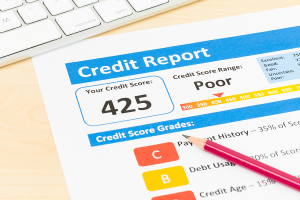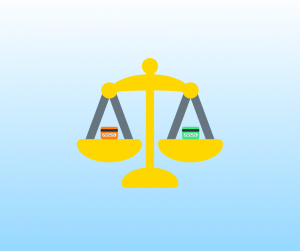How Does a Late Payment Impact Your Credit Score?

7 Financial Topics to Master—Or Be Manipulated By
09/09/2022
DIY Credit Repair Basics
09/18/2022 Payment history is the most important factor for your FICO score. It accounts for 35% of your FICO score. So, if you miss a payment, that could have a big impact on your credit score.
Payment history is the most important factor for your FICO score. It accounts for 35% of your FICO score. So, if you miss a payment, that could have a big impact on your credit score.
If you miss a payment, you are likely wondering how much it will hurt your score. Let’s explore how a missed payment will affect your credit score. Plus, we’ll discuss what actually counts as a missed payment.
Missed Payments and Credit Scores
Life happens even to the best of budgeters. When life gets busy, it’s easy to miss a payment.
But in the world of credit reports, a missed payment isn’t as simple as making your payment after the due date. Here’s a closer look at exactly what counts as a missed payment and how it could impact your credit score.
What Counts as a Missed Payment for Your Credit Report?
First things first, what is a missed payment?
When it comes to your credit report, a missed payment can only be added to your credit report if you don’t make the payment within 30 days of the due date. So, if you pay the bill 29 days after the due date, it shouldn’t show up on your credit report. If the late payment doesn’t make it to your credit report, then it won’t impact your credit score.
Of course, paying your bill late still might come with expensive late fees. But if you are within the 30-day window, the mistake shouldn’t impact your credit score. The breathing room offered by this rule may give your budget the space you need to catch up on your bills. But be prepared to face late fees if you miss the due date at all.
It’s worth noting that lenders process payments within different timeframes. If you are planning to make a payment on the 29th day, the lender may or may not process it in time to avoid a hit to your credit score. With that, it’s important to communicate with the lender about payment processing timelines when you miss a due date.
Additionally, talking to your lender about the situation could lead to a reprieve. In some cases, the lender may extend the due date or work out a new payment plan. In either case, the adjustment could help your credit score avoid a hit.
How Will a Late Payment Impact Your Credit Score?
After the 30-day mark, your lender will usually notify the three credit bureaus of your late payment. At that point, your late payment shows up on your credit report.
Since your payment history accounts for 35% of your FICO score, this will have a negative impact on your credit score. Although the exact hit to your credit varies, you could see a drop of up to 100 points in some cases.
The longer your payment is late, the more your credit score will suffer. For example, having a payment that’s 60, 90, or 120 days past due will have a bigger impact on your credit score than a single payment that was 30 days late.
How Long Will a Late Payment Stay on Your Credit Report?
Once a late payment makes its way onto your credit report, it will stick around for a while—up to seven years.
One way to get a late payment removed is if the information is incorrect. For example, let’s say that you make a payment after the due date but before the 30-day mark. If the payment is counted as late on your credit report, you could dispute it with the credit bureaus to have it removed.
In some cases, the lender will grant your request to have the late payment removed from your credit report. If you want to pursue this route, you can send a goodwill letter that outlines the situation. Be prepared to provide information about why you missed the payment. It will help your case if you previously made on-time payments to the lender. At the end of the letter, state your request to have the spot removed from your credit report. But not all lenders will grant your request.
How to Improve Your Credit Score After a Missed Payment
Regardless of the reasons behind your missed payment, your credit score will likely suffer in a big way. After all, your payment history accounts for 35% of your FICO score.
The good news is that you can start to rebuild your credit score immediately. Here’s a closer look at some of the strategies you can implement to rebuild your credit score after a missed payment.
Don’t Miss Any More Payments
One missed payment will hurt your credit score. But the impacts are much greater if you miss multiple payments. After missing one payment, try to make paying your bills on time a top priority.
Rebuilding a history of on-time payments should lead to a higher credit score. But paying your bills on time is not always an easy option.
If you struggle to remember your payment deadlines, then consider harnessing the power of technology. Many bill providers offer an autopay option to streamline your bill payments. If you have the option, use autopay to avoid missing payments due to forgetfulness. Instead, you can set it up and forget about it.
However, sometimes remembering the payment deadline isn’t the problem. If you are facing a more entrenched cash flow issue, it’s time to take a serious look at your finances. It might be appropriate to cut back on extra spending or look into creating additional income streams to alleviate your cash flow crunch for the long term.
For an immediate cash crunch, you’ll likely know in advance if you won’t be able to make a payment on time. When you realize the predicament, reach out to the lender immediately. If you explain the situation, some creditors will offer temporary forbearance while you get back on your feet. Creditors are more likely to offer a reprieve if you usually pay your bills on time and reach out well in advance.
A final way to avoid missed payments is to rearrange your payment due dates to fit your pay schedule better. Depending on your situation, you might decide to bunch up your due dates toward one part of the month or spread them out to accommodate a more fluid payment schedule. Many lenders allow you to change your due date by making a simple request. If you aren’t sure whether or not your lenders offer this option, don’t be afraid to ask because the worst they can say is no.
Monitor Your Credit Report
The information on our credit report is the basis of your credit score. Negative information on your credit report will result in a lower credit score.
It’s important to check out your credit report regularly to ensure that no mistakes are dragging your credit score down. At the very least, plan to look at your credit report once a year. It’s easy to do this for free at AnnualCreditReport.com.
If you spot incorrect information, you can dispute it with the credit bureaus. For example, if a lender accidentally reports a missed payment, you can bring up the issue with the credit bureaus to have it removed. Be prepared to provide information about the payment to prove that it is indeed a mistake.
Lower Your Credit Utilization Ratio
Your credit utilization ratio is a measure of how heavily you use your credit accounts, and it’s an important factor in credit scoring.
For example, let’s say that you have a credit card with a $10,000 credit limit. If you have a balance of $1,000, then your credit utilization ratio would be 10%. This ratio is only measured on your revolving accounts, such as credit cards.
In general, a lower credit utilization ratio leads to a higher credit score. It’s ideal to keep your utilization ratio under 10%, or as low as you can. To lower your credit utilization ratio, consider paying off revolving account balances or asking for a higher credit limit.
Pay Off Debts
As mentioned, one way to keep your credit utilization ratio low is to pay off your debts. With that, paying off your revolving debts could help you improve your credit score.
But paying off debt is often easier said than done, especially if you have a high interest rate attached to your credit card debt. If you are ready to pay down debt, though, two effective strategies include the snowball method and the avalanche method.
When using the snowball method, you’ll pay down debts starting with your smallest balance first. After paying that off, you will move to the next highest balance and continue to work your way up. With each debt you repay, you can wrap that minimum payment into your debt snowball to tackle the next largest debt. Over time the snowball grows.
Another popular method is the avalanche method. In this strategy, you’ll start by paying off the loan with the highest interest rate first. After you eliminate that debt, you can use that minimum payment to start chipping away at the debt with the next highest interest rate.
Both strategies can help you pay down debt. The right strategy for your situation varies. If you are motivated by small wins, then the snowball method will help you stay focused. But if you want to go with the more mathematically efficient option, then give the avalanche method a try.
Get Credit for Alternative Payments
In many cases, your credit payments are not the only bills you have to pay. After all, most of us pay for rent, utilities, and streaming services. Although you cannot get credit for these payments automatically, you can if you enlist the help of the right services.
Services like Experian Boost will link to your bank account to find out if you are making select bill payments online. If you are, the payments could be added to your credit report. The average Experian Boost user reports that their credit score has increased by 13 points. Other services, like Rental Kharma and Rent Reports, can help you get credit for rent payments.
But there is an important caveat. The bills must be in your name to get credit for the payments. With that, you won’t get credit if you are splitting the utility bill with a roommate if you just send your portion directly to them.
Use Credit Repair
When a creditor makes a mistake or a fraudster gets ahold of your information, you’ll see incorrect information popping up on your credit report. Often, this incorrect information will drag your credit score down. After all, fraudsters aren’t known for paying your bills on time with your stolen identity.
Although finding incorrect information on your credit report can be annoying, it’s not the end of the world because you can have it removed through credit repair. You can contact the credit bureaus with a dispute if you spot an error on your credit report. If you provide the appropriate information, it should be removed within 30 days.
But sometimes, you don’t have the time or energy to take the DIY path. In that case, you can hire the services of a professional credit repair service. A reputable service will remove incorrect information quickly.
Become an Authorized User
With this strategy, you are added as an authorized user to someone else’s credit card. Depending on the card issuer, the history of the account will begin to appear on your credit report.
This can be a great option for those who have family members or friends with credit cards in good standing. However, proceed with caution, as any negative activity on the part of the primary account holder will hurt your credit as well.
The Bottom Line
A late payment, if you don’t catch the mistake within the 30-day window, can wreak havoc on your credit score. But it’s possible to start rebuilding your credit score immediately after this mistake happens. Take action to start rebuilding your credit score today.








1 Comment
Why does my FICO score show one 30-day late payment and one 60-day late payment when all three credit bureaus show no late payments? My credit bureau scores are all around 825 while my FICO score is around 750.